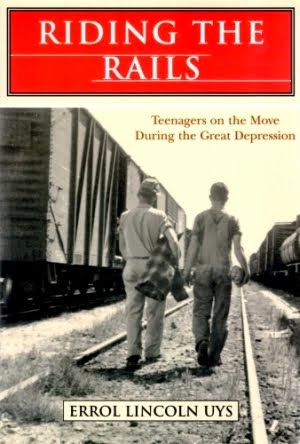
On Sunday, May 8, 1938, Claude Franklin, 13, his brother, Charles, 16, and their buddy, Robert Brookshire, also 13, ran away from their Fort Worth homes. They joined a quarter of a million teenage hoboes roaming America. Some left home believing they were burdens on their families; some fled, broken by the shame of unemployment and poverty, others left eager for what seemed to be a great adventure. This is Claude Franklin's story excerpted from my book, Riding the Rails: Teenagers on the Move During the Great Depression
The night before our departure, we put our extra clothes in paper sacks, sneaked them out of the house and buried them under bushes. We didn't want to carry a bundle or bag. That would be a dead giveaway.
We set out after church on Sunday, and headed for the Texas and Pacific Railroad yards on the west side of Fort Worth.
We knew our mothers would be worried sick, but we didn't leave a note. We didn't want them to stop us. What a cruel thing to do on Mother's Day!
 My father had raised cotton in Mississippi. We decided we would go down to the Mississippi Delta, where we'd heard the cotton was tall and easy to pick. We saw ourselves making a pile of money. We took the Cotton Belt Line through East Texas and Arkansas. At Brinkley we switched to the Frisco Line and continued on to Memphis, Tennessee; then down to Mississippi.
My father had raised cotton in Mississippi. We decided we would go down to the Mississippi Delta, where we'd heard the cotton was tall and easy to pick. We saw ourselves making a pile of money. We took the Cotton Belt Line through East Texas and Arkansas. At Brinkley we switched to the Frisco Line and continued on to Memphis, Tennessee; then down to Mississippi.We found a farm a few miles from Cleveland, where they needed cotton pickers. We asked for jobs and they said, "OK, 75 cents a 100 pounds." They'd a room where we could sleep and a lady who would feed us. We'd pay $10 a week, which would be taken out of our earnings
The next morning we went out to pick cotton. My back began to ache in 30 minutes. It didn't take much longer before my fingers became sore, with pricks and scratches from the cotton burrs.

Cotton picking was hard work! When you get a good quantity of cotton in your bag, you take it down to the end of row where they have a scale and a wagon. You go back and start again. Your back gets stiff and sore. You have to stand up and stretch and all this time you aren't picking. If you aren't picking, you aren't making any money.
A good picker would weigh up 40 or 50 pounds; my bag would be about 30 to 35 pounds. It took several weigh-ins for me to reach 100 pounds. At the end of the day, I had 150 or 160 pounds.
Mid-morning on Friday, we'd had enough. We didn't know how many pounds we'd picked because we hadn't kept track ourselves. We thought that at noon we'd weigh up and ask them to pay us off. They paid on Saturday, but we figured that if we got them to give us our money on Friday, we'd take it and leave without paying for our room and board.
They weren't dumb enough to let us get away with anything like that. When we told them we were quitting, the man said OK. He added up our weigh-ins and multiplied them by 75 cents per hundred. Then he hit us with a bombshell: "Now, boys, we have to take out for your room and board."
Charles had 55 cents coming, I had 35 cents, and Robert was a nickel in the hole.
We made our way back to Cleveland, Mississippi and caught a train for Memphis. By now it was late October, the nights were getting cold; we were growing weary of sleeping in boxcars, cotton gins and under bridges. We decided to head home.

[Images: Courtesy of the Library of Congress, Prints and Photographs Division Washington, DC 20540 USA]
Riding the Rails: Teenagers on the Move During the Great Depression



